Abstract
Discriminatory treatment of African Americans in healthcare is well recognized, yet the literature is unclear on the specific role that perceived racism and mistrust play in the patient-provider relationship. The purpose of this study was to test a mid-range theoretical model entitled Perceptions of Racism and Mistrust in Health Care (PRMHC). This model hypothesized that perceived racism influences cultural mistrust, which affects trust in providers--and these combined psychosocial aspects of healthcare affect satisfaction with the care received. One-hundred-forty-five African-American subjects participated in structured interviews to collect demographic and psychosocial data. Provider data was obtained through chart audits. In a group of low-income African Americans in two primary care clinics, perceptions of racism and mistrust of whites had a significant negative effect on trust and satisfaction. Perceived racism had both a significant, inverse direct effect on satisfaction as well as a significant indirect effect on satisfaction mediated by cultural mistrust and trust in provider. Structural equation modeling analysis supported the hypothesized theoretical relationships and explained 27% of the variance in satisfaction with care. The findings add to the existing literature by enhancing our understanding of the complex perspectives on trust and overall satisfaction with care among African-American patients. Results suggest that improving health outcomes for African Americans requires a broader understanding of cultural competence, one that addresses societal racism and its impact on provider-patient relationships.
Full text
PDF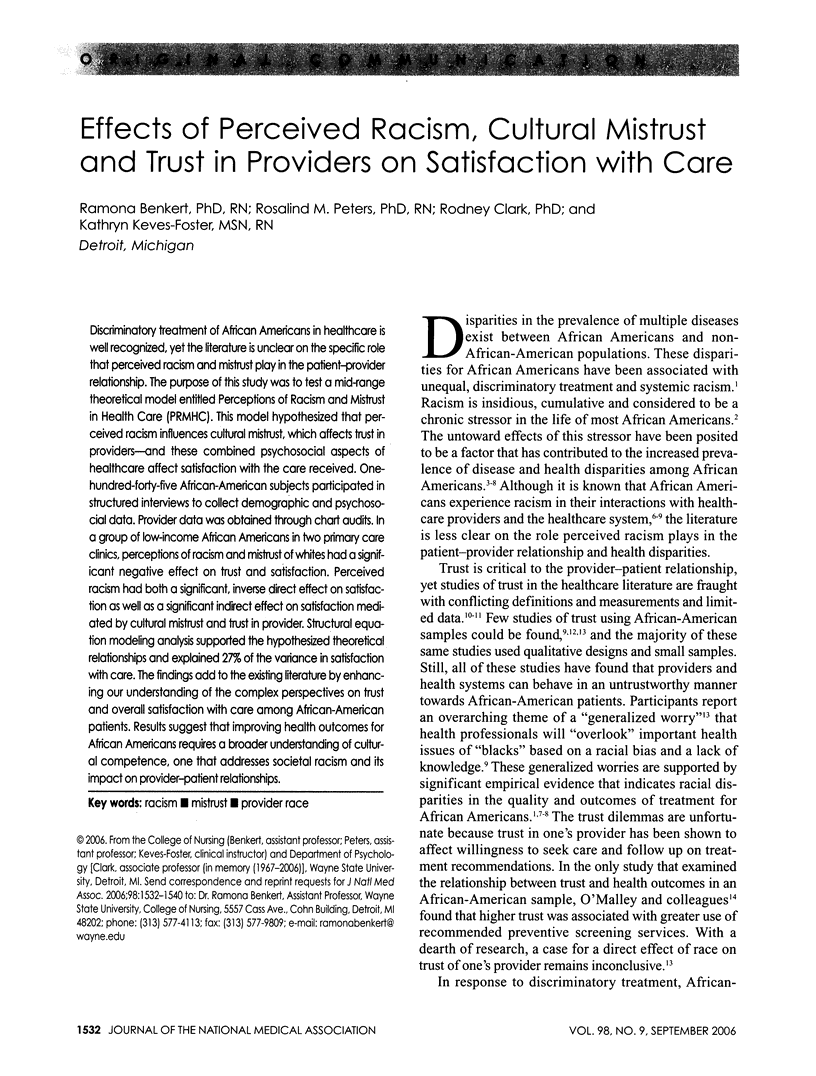
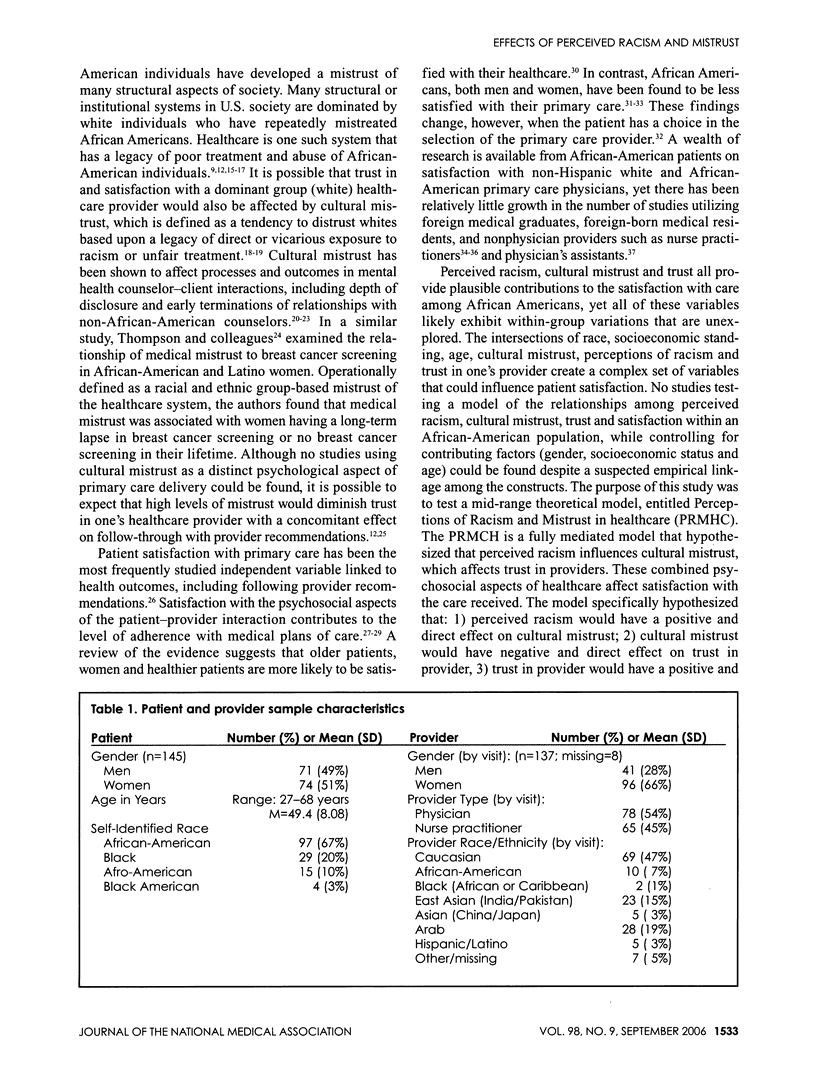
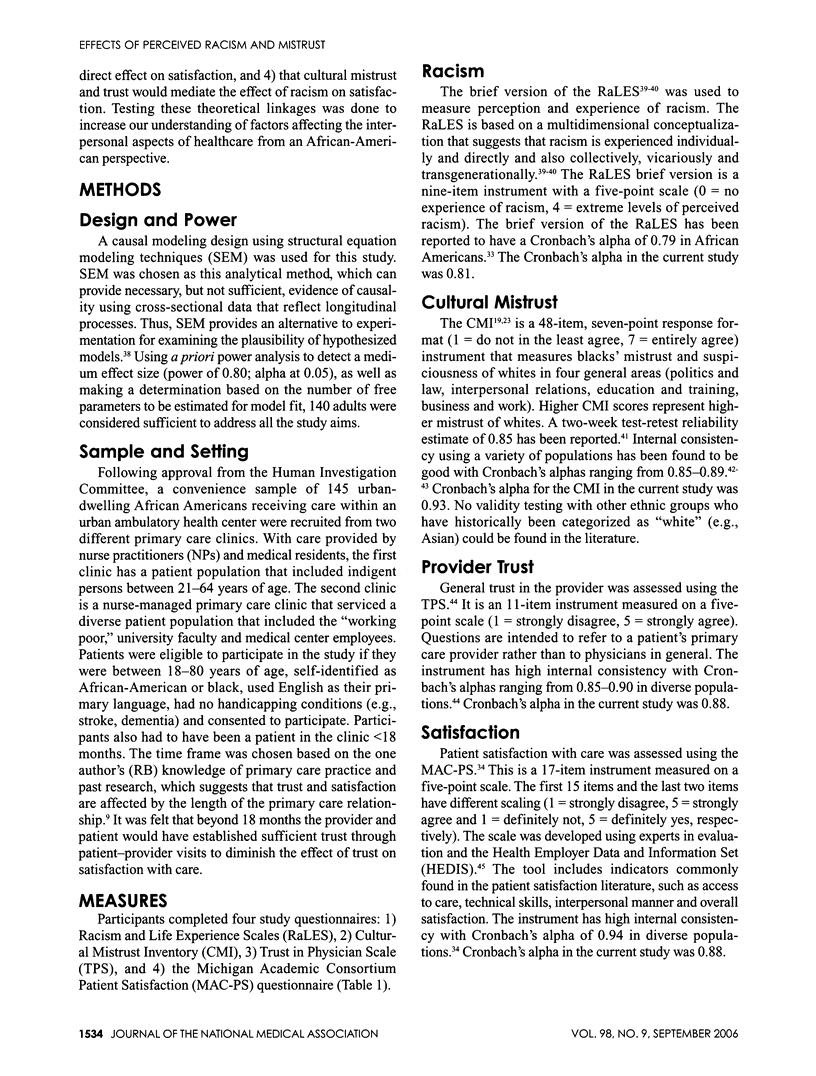
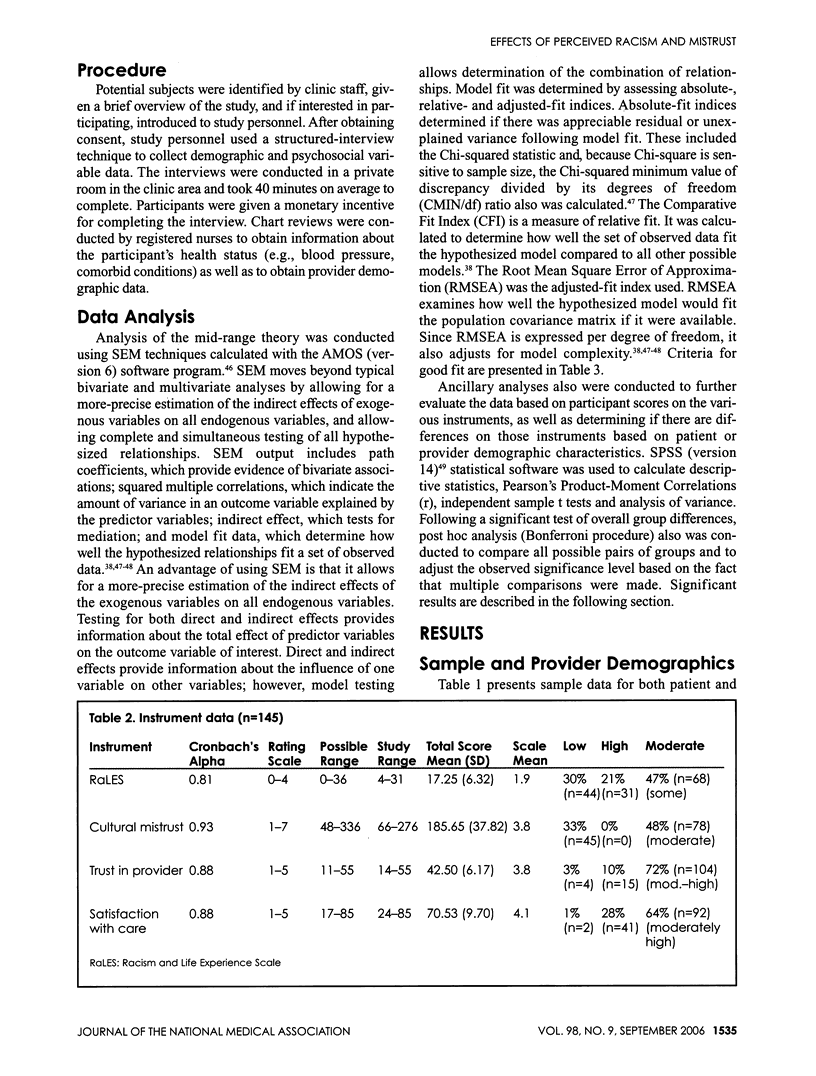
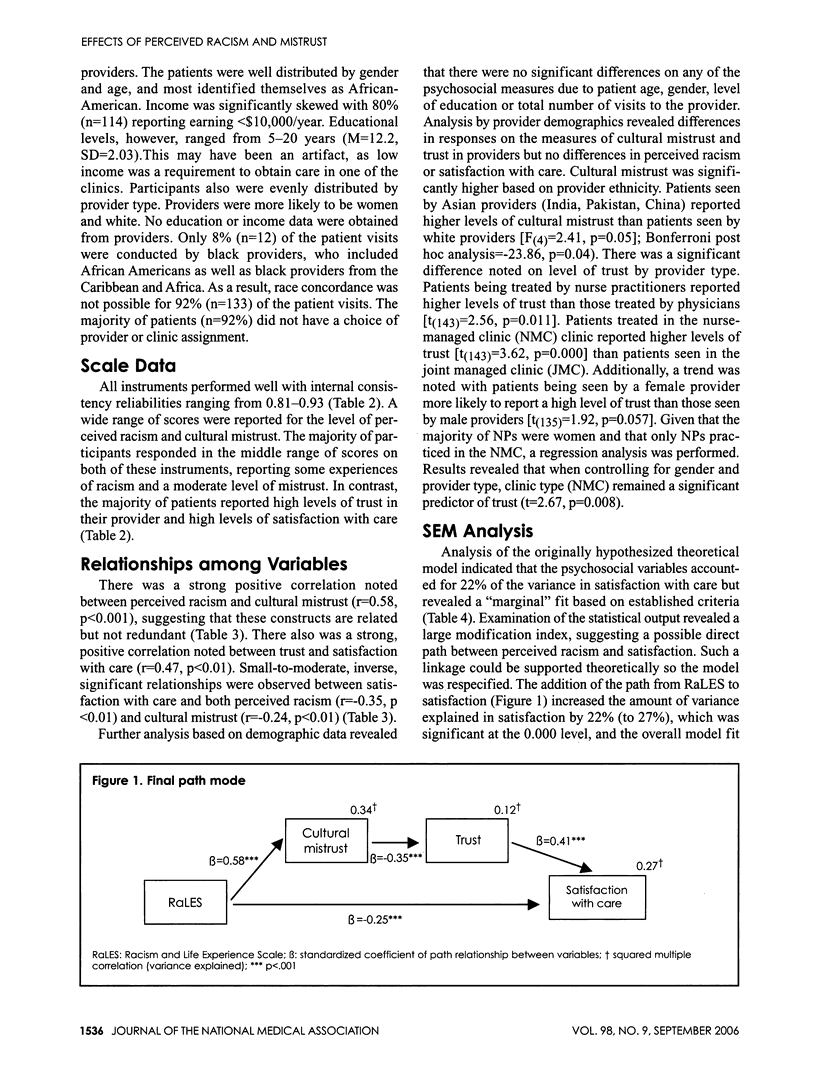
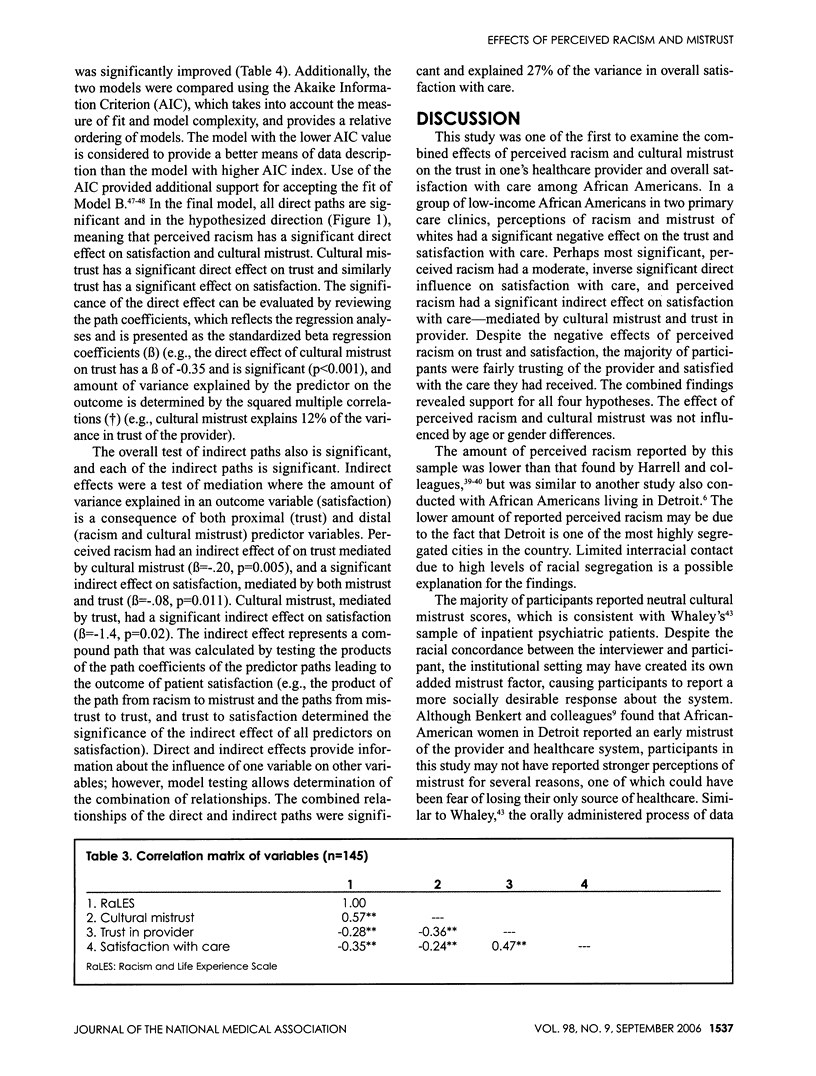
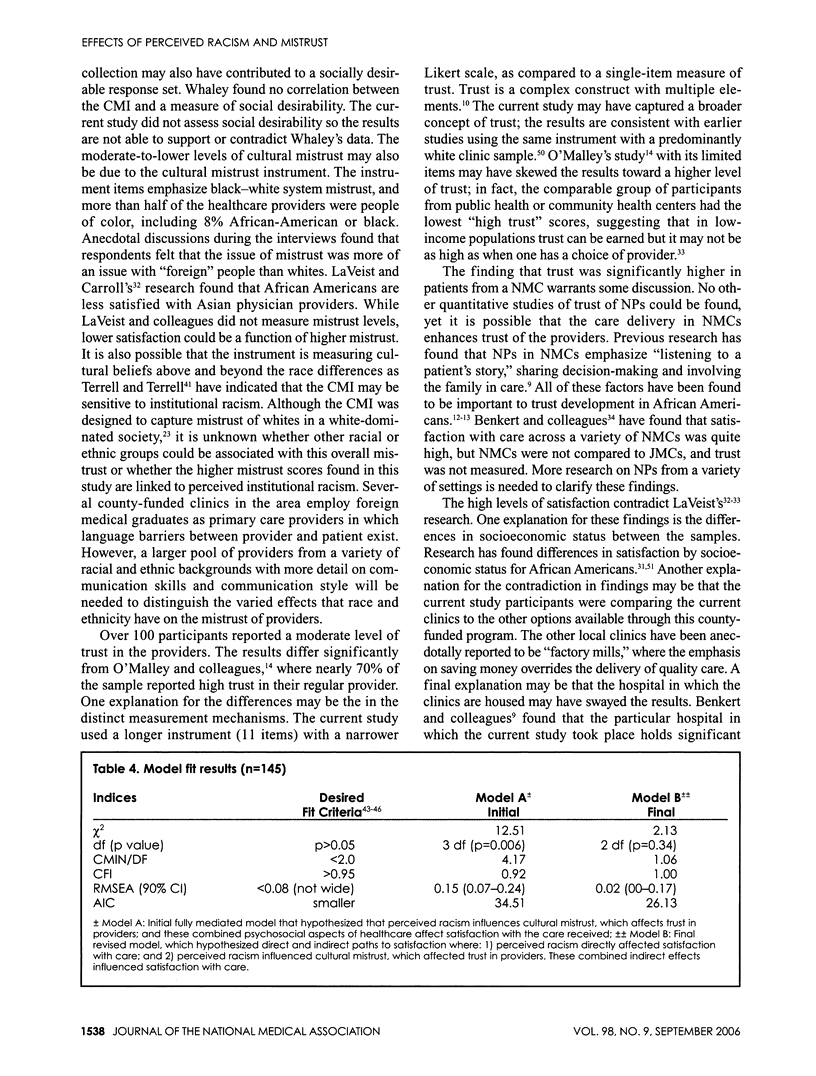
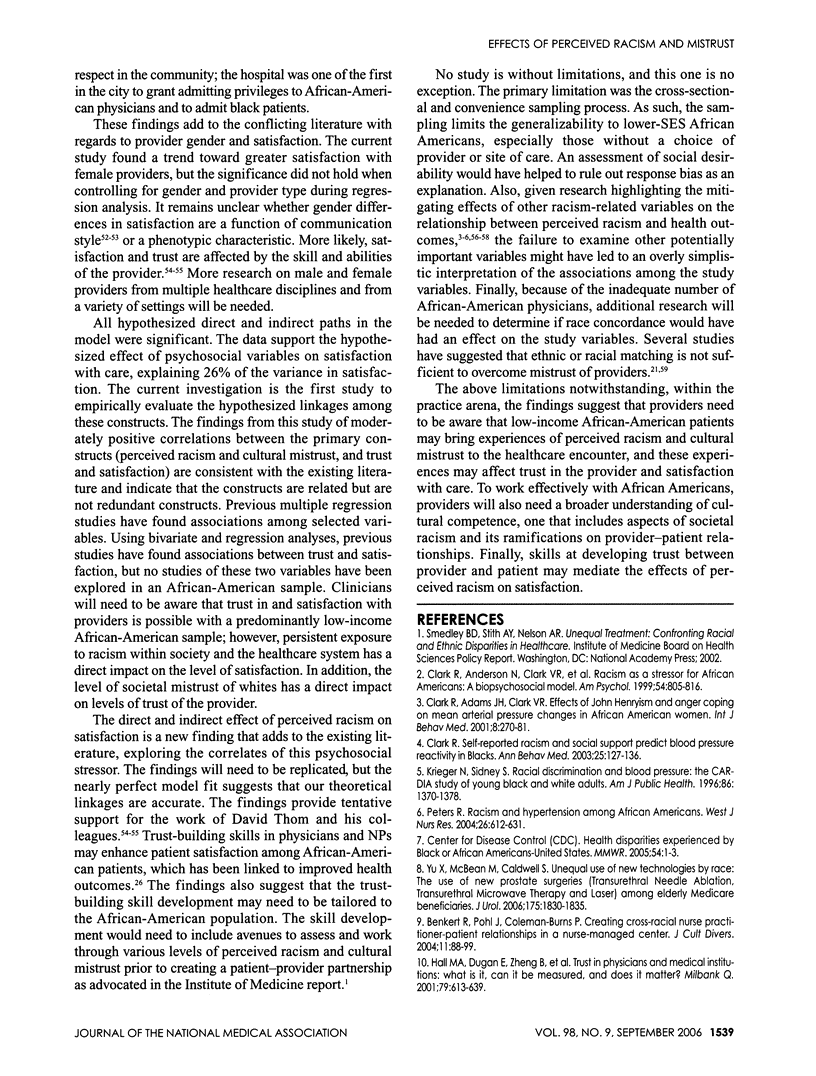
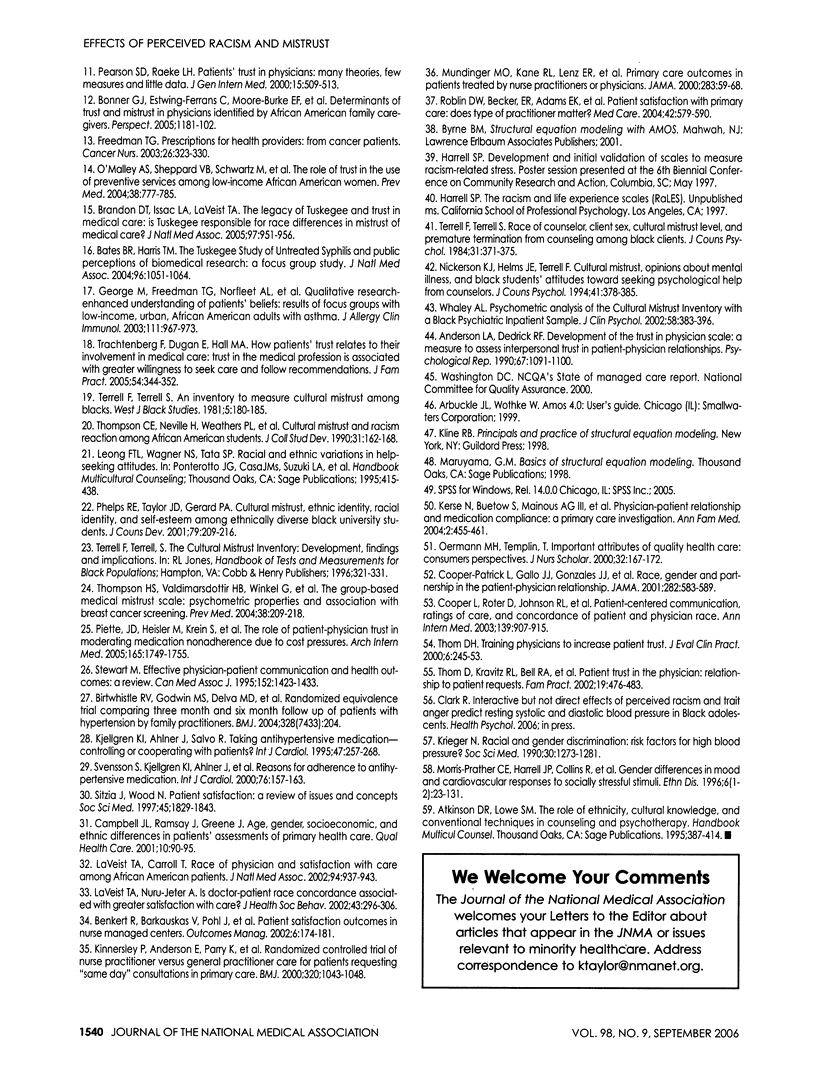
Selected References
These references are in PubMed. This may not be the complete list of references from this article.
- American Academy of Family Physicians Information from your family doctor. Cerebral palsy in children: what you should know. Am Fam Physician. 2006 Jan 1;73(1):101–102. [PubMed] [Google Scholar]
- Anderson L. A., Dedrick R. F. Development of the Trust in Physician scale: a measure to assess interpersonal trust in patient-physician relationships. Psychol Rep. 1990 Dec;67(3 Pt 2):1091–1100. doi: 10.2466/pr0.1990.67.3f.1091. [DOI] [PubMed] [Google Scholar]
- Bates Benjamin R., Harris Tina M. The Tuskegee Study of Untreated Syphilis and public perceptions of biomedical research: a focus group study. J Natl Med Assoc. 2004 Aug;96(8):1051–1064. [PMC free article] [PubMed] [Google Scholar]
- Benkert Ramona, Barkauskas Violet, Pohl Joanne, Corser William, Tanner Clare, Wells Margaret, Nagelkirk Jean. Patient satisfaction outcomes in nurse-managed centers. Outcomes Manag. 2002 Oct-Dec;6(4):174–181. [PubMed] [Google Scholar]
- Benkert Ramona, Pohl Joanne M., Coleman-Burns Patricia. Creating cross-racial primary care relationships in a nurse-managed center. J Cult Divers. 2004 Fall;11(3):88–99. [PubMed] [Google Scholar]
- Birtwhistle Richard V., Godwin Marshall S., Delva M. Dianne, Casson R. Ian, Lam Miu, MacDonald Susan E., Seguin Rachelle, Rühland Lucia. Randomised equivalence trial comparing three month and six month follow up of patients with hypertension by family practitioners. BMJ. 2004 Jan 15;328(7433):204–204. doi: 10.1136/bmj.37967.374063.EE. [DOI] [PMC free article] [PubMed] [Google Scholar]
- Brandon Dwayne T., Isaac Lydia A., LaVeist Thomas A. The legacy of Tuskegee and trust in medical care: is Tuskegee responsible for race differences in mistrust of medical care? J Natl Med Assoc. 2005 Jul;97(7):951–956. [PMC free article] [PubMed] [Google Scholar]
- Campbell J. L., Ramsay J., Green J. Age, gender, socioeconomic, and ethnic differences in patients' assessments of primary health care. Qual Health Care. 2001 Jun;10(2):90–95. doi: 10.1136/qhc.10.2.90. [DOI] [PMC free article] [PubMed] [Google Scholar]
- Clark R., Anderson N. B., Clark V. R., Williams D. R. Racism as a stressor for African Americans. A biopsychosocial model. Am Psychol. 1999 Oct;54(10):805–816. doi: 10.1037//0003-066x.54.10.805. [DOI] [PubMed] [Google Scholar]
- Clark Rodney. Self-reported racism and social support predict blood pressure reactivity in Blacks. Ann Behav Med. 2003 Spring;25(2):127–136. doi: 10.1207/S15324796ABM2502_09. [DOI] [PubMed] [Google Scholar]
- Cooper-Patrick L., Gallo J. J., Gonzales J. J., Vu H. T., Powe N. R., Nelson C., Ford D. E. Race, gender, and partnership in the patient-physician relationship. JAMA. 1999 Aug 11;282(6):583–589. doi: 10.1001/jama.282.6.583. [DOI] [PubMed] [Google Scholar]
- Cooper Lisa A., Roter Debra L., Johnson Rachel L., Ford Daniel E., Steinwachs Donald M., Powe Neil R. Patient-centered communication, ratings of care, and concordance of patient and physician race. Ann Intern Med. 2003 Dec 2;139(11):907–915. doi: 10.7326/0003-4819-139-11-200312020-00009. [DOI] [PubMed] [Google Scholar]
- Freedman Tovia G. Prescriptions for health providers: from cancer patients. Cancer Nurs. 2003 Aug;26(4):323–330. doi: 10.1097/00002820-200308000-00011. [DOI] [PubMed] [Google Scholar]
- George Maureen, Freedman Tovia G., Norfleet A. Lorraine, Feldman Harold I., Apter Andrea J. Qualitative research-enhanced understanding of patients' beliefs: results of focus groups with low-income, urban, African American adults with asthma. J Allergy Clin Immunol. 2003 May;111(5):967–973. doi: 10.1067/mai.2003.1459. [DOI] [PubMed] [Google Scholar]
- Hall M. A., Dugan E., Zheng B., Mishra A. K. Trust in physicians and medical institutions: what is it, can it be measured, and does it matter? Milbank Q. 2001;79(4):613-39, v. doi: 10.1111/1468-0009.00223. [DOI] [PMC free article] [PubMed] [Google Scholar]
- Kerse Ngaire, Buetow Stephen, Mainous Arch G., 3rd, Young Gregory, Coster Gregor, Arroll Bruce. Physician-patient relationship and medication compliance: a primary care investigation. Ann Fam Med. 2004 Sep-Oct;2(5):455–461. doi: 10.1370/afm.139. [DOI] [PMC free article] [PubMed] [Google Scholar]
- Kinnersley P., Anderson E., Parry K., Clement J., Archard L., Turton P., Stainthorpe A., Fraser A., Butler C. C., Rogers C. Randomised controlled trial of nurse practitioner versus general practitioner care for patients requesting "same day" consultations in primary care. BMJ. 2000 Apr 15;320(7241):1043–1048. doi: 10.1136/bmj.320.7241.1043. [DOI] [PMC free article] [PubMed] [Google Scholar]
- Kjellgren K. I., Ahlner J., Säljö R. Taking antihypertensive medication--controlling or co-operating with patients? Int J Cardiol. 1995 Jan 6;47(3):257–268. doi: 10.1016/0167-5273(94)02203-u. [DOI] [PubMed] [Google Scholar]
- Krieger N. Racial and gender discrimination: risk factors for high blood pressure? Soc Sci Med. 1990;30(12):1273–1281. doi: 10.1016/0277-9536(90)90307-e. [DOI] [PubMed] [Google Scholar]
- Krieger N., Sidney S. Racial discrimination and blood pressure: the CARDIA Study of young black and white adults. Am J Public Health. 1996 Oct;86(10):1370–1378. doi: 10.2105/ajph.86.10.1370. [DOI] [PMC free article] [PubMed] [Google Scholar]
- LaVeist Thomas A., Carroll Tamyra. Race of physician and satisfaction with care among African-American patients. J Natl Med Assoc. 2002 Nov;94(11):937–943. [PMC free article] [PubMed] [Google Scholar]
- Laveist Thomas A., Nuru-Jeter Amani. Is doctor-patient race concordance associated with greater satisfaction with care? J Health Soc Behav. 2002 Sep;43(3):296–306. [PubMed] [Google Scholar]
- Morris-Prather C. E., Harrell J. P., Collins R., Leonard K. L., Boss M., Lee J. W. Gender differences in mood and cardiovascular responses to socially stressful stimuli. Ethn Dis. 1996 Winter-Spring;6(1-2):123–131. [PubMed] [Google Scholar]
- Mundinger M. O., Kane R. L., Lenz E. R., Totten A. M., Tsai W. Y., Cleary P. D., Friedewald W. T., Siu A. L., Shelanski M. L. Primary care outcomes in patients treated by nurse practitioners or physicians: a randomized trial. JAMA. 2000 Jan 5;283(1):59–68. doi: 10.1001/jama.283.1.59. [DOI] [PubMed] [Google Scholar]
- O'Malley Ann S., Sheppard Vanessa B., Schwartz Marc, Mandelblatt Jeanne. The role of trust in use of preventive services among low-income African-American women. Prev Med. 2004 Jun;38(6):777–785. doi: 10.1016/j.ypmed.2004.01.018. [DOI] [PubMed] [Google Scholar]
- Oermann M. H., Templin T. Important attributes of quality health care: consumer perspectives. J Nurs Scholarsh. 2000;32(2):167–172. doi: 10.1111/j.1547-5069.2000.00167.x. [DOI] [PubMed] [Google Scholar]
- Pearson S. D., Raeke L. H. Patients' trust in physicians: many theories, few measures, and little data. J Gen Intern Med. 2000 Jul;15(7):509–513. doi: 10.1046/j.1525-1497.2000.11002.x. [DOI] [PMC free article] [PubMed] [Google Scholar]
- Peters Rosalind M. Racism and hypertension among African Americans. West J Nurs Res. 2004 Oct;26(6):612–631. doi: 10.1177/0193945904265816. [DOI] [PubMed] [Google Scholar]
- Piette John D., Heisler Michele, Krein Sarah, Kerr Eve A. The role of patient-physician trust in moderating medication nonadherence due to cost pressures. Arch Intern Med. 2005 Aug 8;165(15):1749–1755. doi: 10.1001/archinte.165.15.1749. [DOI] [PubMed] [Google Scholar]
- Roblin Douglas W., Becker Edmund R., Adams E. Kathleen, Howard David H., Roberts Melissa H. Patient satisfaction with primary care: does type of practitioner matter? Med Care. 2004 Jun;42(6):579–590. doi: 10.1097/01.mlr.0000128005.27364.72. [DOI] [PubMed] [Google Scholar]
- Sitzia J., Wood N. Patient satisfaction: a review of issues and concepts. Soc Sci Med. 1997 Dec;45(12):1829–1843. doi: 10.1016/s0277-9536(97)00128-7. [DOI] [PubMed] [Google Scholar]
- Stewart M. A. Effective physician-patient communication and health outcomes: a review. CMAJ. 1995 May 1;152(9):1423–1433. [PMC free article] [PubMed] [Google Scholar]
- Svensson S., Kjellgren K. I., Ahlner J., Säljö R. Reasons for adherence with antihypertensive medication. Int J Cardiol. 2000 Nov-Dec;76(2-3):157–163. doi: 10.1016/s0167-5273(00)00374-0. [DOI] [PubMed] [Google Scholar]
- Thom D. H. Training physicians to increase patient trust. J Eval Clin Pract. 2000 Aug;6(3):245–253. doi: 10.1046/j.1365-2753.2000.00249.x. [DOI] [PubMed] [Google Scholar]
- Thom David H., Kravitz Richard L., Bell Robert A., Krupat Edward, Azari Rahman. Patient trust in the physician: relationship to patient requests. Fam Pract. 2002 Oct;19(5):476–483. doi: 10.1093/fampra/19.5.476. [DOI] [PubMed] [Google Scholar]
- Thompson Hayley S., Valdimarsdottir Heiddis B., Winkel Gary, Jandorf Lina, Redd William. The Group-Based Medical Mistrust Scale: psychometric properties and association with breast cancer screening. Prev Med. 2004 Feb;38(2):209–218. doi: 10.1016/j.ypmed.2003.09.041. [DOI] [PubMed] [Google Scholar]
- Trachtenberg Felicia, Dugan Elizabeth, Hall Mark A. How patients' trust relates to their involvement in medical care. J Fam Pract. 2005 Apr;54(4):344–352. [PubMed] [Google Scholar]
- Whaley Arthur L. Psychometric analysis of the cultural mistrust inventory with a Black psychiatric inpatient sample. J Clin Psychol. 2002 Apr;58(4):383–396. doi: 10.1002/jclp.1150. [DOI] [PubMed] [Google Scholar]
- Yu Xinhua, McBean A. Marshall, Caldwell Debra S. Unequal use of new technologies by race: the use of new prostate surgeries (transurethral needle ablation, transurethral microwave therapy and laser) among elderly Medicare beneficiaries. J Urol. 2006 May;175(5):1830–1835. doi: 10.1016/S0022-5347(05)00997-3. [DOI] [PubMed] [Google Scholar]


